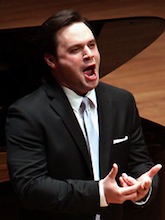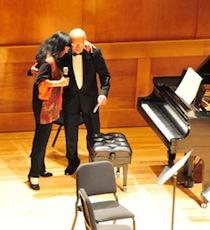
Following the template of the three previous major concert programs in Music@Menlo’s season, titled “Through Brahms,” Tuesday’s “Songs of Love” framed 20 of Brahms’ songs with others by composers who preceded and followed him. Thus did Brahms’ gorgeous Zwei Gesänge, Op. 91 (aka the Two Songs for alto, viola and piano), and 18 lighthearted Liebeslieder Waltzes, Op. 52, for vocal quartet and piano duo take their place beside songs of Schubert, Schumann, and Berg in the vocal-friendly Center for the Performing Arts at Menlo-Atherton.
While the rationale for choosing, as the longest work by Brahms on the program, the 18 frothy “Lovesong Waltzes” for vocal quartet and piano duo seemed predicated on the ability to also present the music that inspired them, Schumann’s Spanische Liebeslieder, Op. 138, the choice gave scant indication that the majority of Brahms’ songs are filled with such darkness and sorrow that only a few are regularly recorded and performed.
Both the Schumann and the Brahms works provided opportunity for soprano Katherine Whyte, mezzo-soprano Sasha Cooke, tenor Paul Appleby, and baritone Kelly Markgraf (Cooke’s husband) to sing together in various combinations. If the group efforts were not entirely successful, much of the blame lies with an unexpected double whammy that preceded the concert.
... ardor, dedication, and sensitivity, as well as his beauty of tone, suggested that he could very well earn a place alongside the greats.
Not long after the performers sailed through their final rehearsal without a hitch, soprano Erin Morley phoned pianist Wu Han to whisper through tears that she had lost her voice. A last-minute search for a replacement that extended throughout North America uncovered Whyte, who not only knew Morley’s programmed repertoire, but also was able to fly in on Tuesday from Canada.
Were that 11th-hour drama not enough, Markgraf followed suit with reports of vocal distress. Bowing out of his scheduled three Schumann lieder, he chose to hang in, albeit wan-faced and underpowered, for the Schumann and Brahms group efforts so that he could sing love songs with and to the woman he loves. The upshot, in the case of both Whyte and Markgraf, was vocal imbalance with the other soloists.
Valiant Efforts

As youthful, fresh, and optimistic as Whyte appeared, her glamorous, vibrato-rich voice spoke of a vocally mature woman grounded in heartbreak. The emotional import of her beautiful instrument seemed ideal for her first mournful solo in the Spanische Liebeslieder. Accompanied by Gilbert Kalish and Wu Han (who is known both here and in China as Wu Han rather than by her surname, Wu), she seemed like just what the doctor ordered until it came to Berg’s Sieben frühe Lieder (Seven Early Songs) and numbers where she joined forces with the other singers.
As gorgeous as her voice was in Berg’s almost decadent hothouse romances, and in lighter love songs by Schumann and Brahms, the smile on her face seemed at odds with her elegiac and often tragic sound. In addition, her admirably rounded tone was overpowered in ensemble by the bright, cutting edge of Cooke’s and Appleby’s instruments. Balance issues could have been remedied had there been ample time for rehearsal and greater sensitivity to Whyte’s sound. As it was, Whyte gave promise of potential triumph in repertoire more appropriate to her talent.
No honest assessment of Markgraf’s instrument is possible. Intentionally holding back until the final quartet, he in fact saved the concert. The few times he did sing out, the beauty of his low register shone through.
Gifts
Cooke, who appeared here in May in Mahler’s Symphony No. 2 with the San Francisco Symphony, has emerged with a voice richer and stronger than ever. The bright edge of her sound, however, lacks the heart-centered plushness that has enriched performances of the Opus 91 songs by a number of her mezzo and contralto predecessors.

Her body language also indicated a curious enervation or immobility at the core that seems mirrored in her truncated emotional reach. Such reticence seemed at odds with Paul Neubauer’s ultraromantic viola playing. (Thank goodness for Kalish’s artfully understated pianism.) As much as Cooke’s voice did not touch me, I can well understand those who would counter with cries that the sheer beauty of her instrument, and its admirable security and steadiness throughout her wide range, make her one of the finest young American mezzos of our age.
Appleby’s first phrases in Schubert’s Liebesbotschaft bespoke an understanding and nuance of lieder rarely heard from non-German tenors, let alone from most song recitalists in our age when maidens are extinct and brooks are covered with concrete. If his razor-sharp edge could not yet soften sufficiently in the last verse to rock his sweetheart to sleep and whisper dreams of love, the young tenor’s ardor, dedication, and sensitivity, as well as his beauty of tone, suggested that he could very well earn a place alongside the greats. Perhaps his body gestures and facial expressions, now far too reflective of coaches and mirrors, will also relax as he reaches even deeper into his emotional center.
When Wu Han sat to Kalish’s right in the four-hand piano performances, she wasted no notes announcing who was on top. When Kalish switched places, however, his more velvety touch showed greater attention to partnership. To her credit, Wu Han proved a most sensitive accompanist with Appleby, supporting rather than leading the way. As for Kalish, the contrast between his selfless support of Whyte’s artistry and the beauty of his solo passages suggested an artist of the highest order.

